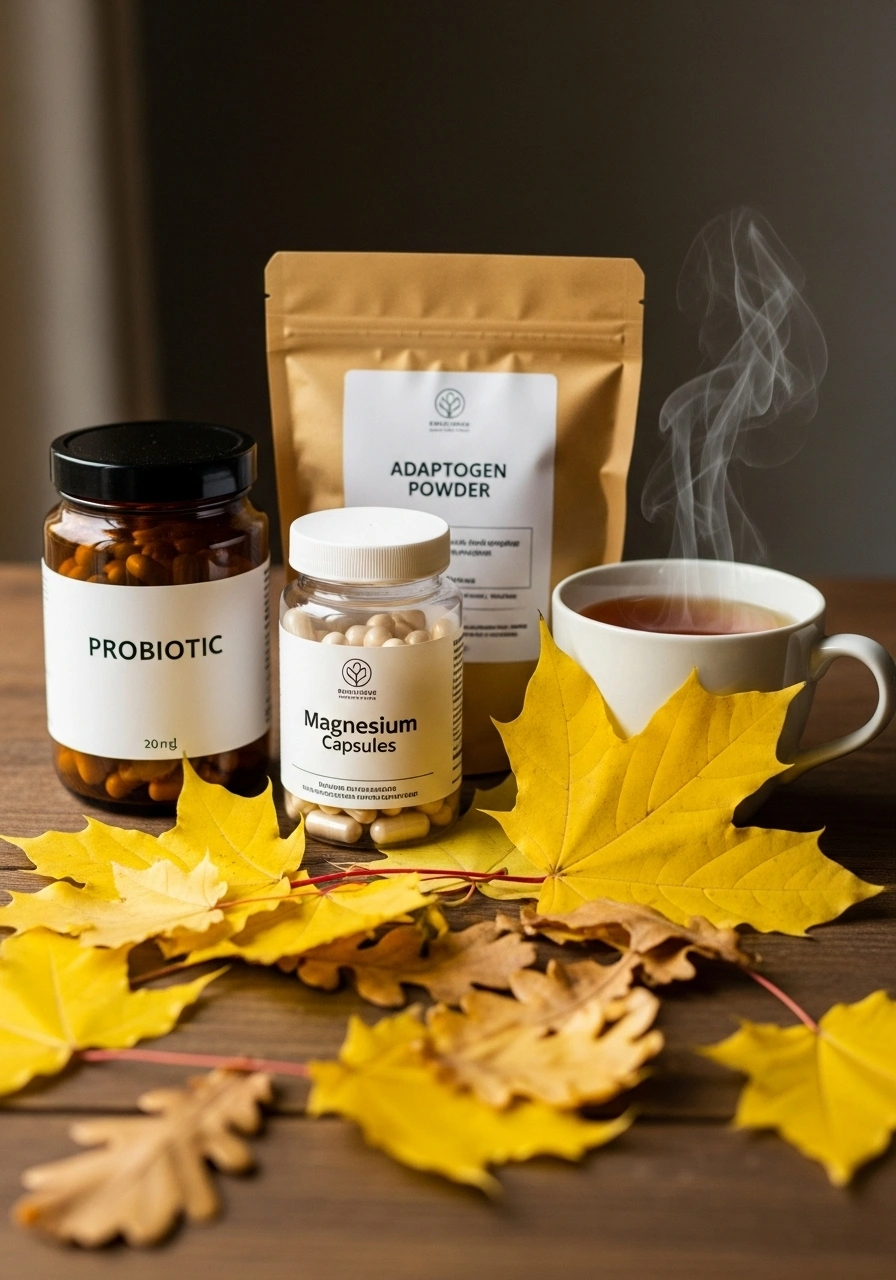

Autumn is a period of adaptation to weather changes, shorter daylight hours, and returning to an intense work and study rhythm.
This is the time when fatigue, weakened immunity, and seasonal mood swings most often appear.
Modern nutraceuticals can gently support the body, reduce stress, and strengthen defenses. In focus of this review — magnesium, probiotics, and adaptogens.

Magnesium: the mineral of calm and energy
Magnesium participates in more than 300 biochemical reactions in the body, including the function of the nervous and muscular systems, sleep regulation, and energy metabolism.
Studies show that magnesium deficiency is associated with increased fatigue, irritability, and risk of cardiovascular diseases【1】.

Forms of magnesium:
- Magnesium citrate — well absorbed, suitable for daily intake.
- Magnesium malate — recommended for fatigue and chronic stress.
- Magnesium oxide — more affordable, but has lower bioavailability.

Probiotics: microbiome balance
Autumn is traditionally associated with a higher risk of colds and digestive disorders that weaken immunity.
Probiotics are live microorganisms that positively affect human health by restoring gut flora balance.
Systematic reviews confirm that taking probiotics may reduce the risk of ARTI, shorten their duration, and support intestinal barrier function【2】.
Main strains with proven benefits:
- Lactobacillus rhamnosus GG — infection prevention in children and adults.
- Bifidobacterium lactis — enhances immune response.
- Saccharomyces boulardii — protects against antibiotic-associated diarrhea.

Adaptogens: nature’s response to stress
Adaptogens are plant extracts that help the body resist stress and restore balance.
Classical representatives — ashwagandha, rhodiola rosea, ginseng.
Clinical studies indicate that adaptogens can lower cortisol levels, improve concentration, and increase endurance【3】.
In autumn, when the body adapts to rhythm changes, they are especially useful as gentle support.
Table 1. Key nutraceuticals for autumn
| Nutraceutical | Main effects | Dosage forms | Recommended for |
|---|---|---|---|
| Magnesium | Relaxation, sleep, energy | Capsules, powders, effervescent tablets | For stress, cramps, fatigue |
| Probiotics | Immunity, digestion, barrier | Capsules, gummies, drinks | Adults and children during cold season |
| Adaptogens | Stress reduction, focus, endurance | Capsules, tinctures, powders | People with high workloads |

Practical tips
- Combine nutraceuticals with basic habits: quality sleep, physical activity, and balanced diet.
- Choose the form most convenient for you (capsules, gummies, or powders). This improves compliance.
- It is advisable to consult a doctor before starting, especially with chronic conditions.
Conclusion
Autumn is the season when the body needs gentle support.
Magnesium helps cope with stress and fatigue, probiotics strengthen immunity, and adaptogens improve endurance and nervous system stability.
Together, they form a simple but effective foundation for a healthy season start.
References
- Gröber U, Schmidt J, Kisters K. Magnesium in Prevention and Therapy. Nutrients. 2015;7(9):8199–8226.
- Hao Q, Dong BR, Wu T. Probiotics for preventing acute upper respiratory tract infections. Cochrane Database Syst Rev. 2015.
- Panossian A, Wikman G. Effects of adaptogens on the central nervous system and the molecular mechanisms associated with their stress—protective activity. Pharmaceuticals. 2010;3(1):188–224.




